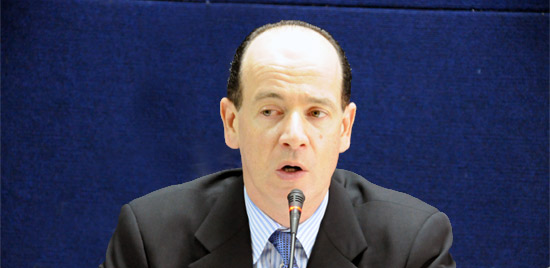
- This event has passed.
Interaction with Enrique Salem, CEO of Symantec
February 24, 2010

IDSA hosted an interactive discussion with Mr. Enrique Salem, President and Chief Executive Officer of Symantec Corporation, on the topic “The Information Security Agenda”. Mr. Salem posed the current challenges in the information security industry in the context of a “New Cold War” with attacks getting increasingly more sophisticated and purposeful. In his introductory remarks, Mr. Salem identified the various trends and challenges facing the information security industry. Beginning from the time that the role of the anti-virus was to protect a computer hard-disk and attendant floppy from viruses unleashed mainly through email by solitary hackers, today the job has expanded to protecting information and data on a variety of devices from a spectrum of actors ranging from criminal organizations to state-affiliated entities. The current reactive approach to protecting devices through identifying viruses was getting increasingly unsustainable, with as many as 1.6 million virus signatures having to be incorporated into each Symantec Update file. Therefore there was a greater need for cooperation between companies, and governments need to go beyond treating viruses as an occupational hazard of being on the internet. Pro-active steps that could be taken included developing an early-warning system that could rapidly differentiate between different types of attacks and trace them to their source. This involved using a variety of methods such as heuristics and constant scanning of internet traffic patterns. Secondly, the current approach of updating anti-virus signatures on a regular basis has to be supplemented with reputation-based security, somewhat similar to Google’s Pagerank algorithmic method. Speedy remediation was another important step, again involving cooperation at various levels, along with working out ways and means of effective counter-measures to eliminate the threat at its source. All this required co-operation across industries as well as with governments; in the United States itself, nearly two-thirds of the internet infrastructure was in private hands, and the same is the case in other countries. The recent attacks on Google were an eye-opener with regard to their sophistication and organization. Substantial amounts of data were moved with military precision, with teams leading the infiltration, other teams moving the information, and yet another covering the tracks. These same capabilities could also be used for cyberattacks.
Questions and comments raised during the discussion that followed included the vulnerabilities of various operating systems, the inadequacies of antiviruses to deal with targeted attacks, the threats posed by identity theft, privacy issues, software piracy and other related issues. In his closing remarks, Dr. Arvind Gupta, who chaired the discussion, dwelt on the issue of affordability of products such as anti-virus software as being an important factor in their usage. He also spoke of the need to revitalise intergovernmental efforts, which had been languishing for sometime, to ensure the security and stability of cyberspace.
Among those who took part in the interaction were officials from the government, the Armed Forces, IDSA scholars and CERT-In.
Prepared by Dr. Cherian Samuel, Associate Fellow at the Institute for Defence Studies and Analyses, New Delhi.







